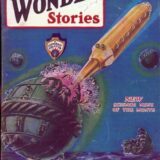Recent events have, shall we say, shaken my belief in the “science fiction future”; not to the point that I believe such things will never happen (you know, like true equality for Earth’s people, the end of poverty and starvation, sensible stewardship of the planet’s bounty [which means utilizing them without sacrificing them], getting our population growth under control, providing good health care to everyone, not allowing corporations to run the roost for profit, enabling folks to educate themselves to the top of their abilities, and, of course, a robust, manned space program that seeks to colonize the solar system). No, that’s still somewhere in our futures. It’s now just going to take us a lot longer to get there.
When things like this happen, I like to remind myself that there’s a group of people on this planet that share the possibility of these visions with me…not in the detailed specifics, but in the general belief that there is a path forward, it’s largely been mapped out and articulated, and a lot of us have lived there already if only vicariously. Come on in, the waters fine!
Earlier generations of would-be Trufans had it a bit easier than we do these days: it was much more difficult for the “real world” to poke its way into fannish doings on a daily basis and, they had a road map.
A road map by way of parable, authored by Walt Willis and Bob Shaw titled THE ENCHANTED DUPLICATOR. (If you are not familiar with those hallowed fannish names, please take a moment to familiarize yourself.)
Now it is true that the tale of Jophan’s quest is rooted in the Fannish sensibilities from a couple of generations ago, but the fact that this piece of “fan” writing has endured for some 60 odd years (originally published in 1954) strongly suggests that its message continues to resonate. The tale suggests that there is one true path to Trufandom; we’ve since learned that there is more than one path, but neither Shaw or Willis should be faulted for not having mapped out the entire territory; pathfinders find a way and their pioneering efforts help those who follow discover other ways.
As a seeker of Trufandom over the years (and as one who strayed into the Glades of Gafia after having turned the crank of a mimeograph) I can personally attest to the veracity and accuracy of this tale: Willis and Shaw captured something important.
Over the years there have been numerous printings of what has fondly become known as TED (I like to think that “TED TALKS” are so named in homage): Ted White published TED as installments of The Club House feature in 1972, including a series of notes on the sometimes obscure references found in the tale.
Gary Farber reprinted the third edition, an edition was published by Seacon, the ’79 Worldcon and, over on Efanzines.com, you can find Taral Wayne’s collection of scanned editions (almost complete) as well as a very fine recounting of the history of this tale. Which is where you’ll also want to go should you desire to read the story.
Which you should.
Which I think anyone who wants to be a fan should – especially those who claim to be fans (big F or small) and claim to understand what Fandom is all about, even though it is painfully apparent that their ignorance is not bliss for the rest of us.
I don’t think it is enough to be familiar with the existence of TED as an historical artifact. One needs to know the parable, even if its lessons are to be rejected (which I’m not suggesting they be – but you should know what you are rejecting before you reject it: the grand prize might just be beind door number 2).
Taral, in writing his introduction to the collection of scanned TED editions had a few good things to say, which I will now quote for you:
…TED’s popularity has much to do with its iconic depiction of how we envision ourselves as fans. We are not so naïve as to think we literally are Jophans, making the mental pilgrimage from the mundane to the trufannish. Nor do we believe that anyone else is as pure of spirit as Jophan. But there is still an unattainable ideal, that we would like to believe in.
Walt Willis was clearly at the top of his form when he wrote The Enchanted Duplicator. As a writer, he was never more graceful or elegant. As an observer of fandom, he evoked all he knew about the true aims of fannishness and the pitfalls along the way. It is almost impossible to think of a danger or detour along the path to the Enchanted Duplicator that Willis has not already described.
Even so, personally I find it difficult to fully appreciate The Enchanted Duplicator for what it is. Issues such as whether or not it is pure-hearted to take subscriptions, or to use a letterpress, seem irrelevant nearly 60 years later. While I’m not naïve enough to have ever believed fans were as pure of heart as Jophan, I’ve seen shades of grey among my peers that are not depicted in the pages of TED. Most of us have become post-moderns – we know what we do is a game, and not to be taken too seriously, yet the rules must be observed as though we do believe, or the game cannot be played. The world around us has changed, too – the line between mundane and fannish has blurred, the dichotomy become far less distinct than it was at one time. We live in a darker world than Jophan did.
I’m still playing the game. I just wish others would remember the rules.
By way of illustration (that I’m still playing), here’s my contribution to the TED oeuvre – a working map, based on Bob Shaw’s original illustration, rendered as a hex map for game play. (This will be followed by a similar rendering of Ross Chamberlains’s map, then the two merged for a final play-testing version.)
I’ve been working on “playing the game” as a “game” for a while now. It’s going to take a lot longer (given personal constraints), but in times like these, I pull it out and fiddle around. I find it comforting to have a place I can go to where the rules are known and the goals are clearly defined.
To help get you started, here is the opening paragraph of THE ENCHANTED DUPLICATOR:
ONCE UPON A TIME in the village of Prosaic in the Country of Mundane there lived a youth called Jophan. Now this youth was unhappy, because in all the length and breadth of Mundane there was no other person with whom he could talk as he would like, or who shared the strange longings that from time to time perplexed his mind and which none of the pleasures offered by Mundane could wholly satisfy. Each day as Jophan grew nearer to manhood he felt more strongly that life should have more to offer than had been dreamed of in Mundane, and he took to reading strange books that told of faraway places and other times. But the People of Prosaic mocked him, saying that the things described in his books could never come to pass, and that it was as foolish to think of them as to aspire to climb the great mountains that surrounded the Country of Mundane.
and, to introduce a touch of modern sensibility into the affair, a slightly modified version:
ONCE UPON A TIME in the village of Prosaic in the Country of Mundane there lived a youth called Jophan. Now this youth was unhappy, because in all the length and breadth of Mundane there was no other person with whom she could talk as she would like, or who shared the strange longings that from time to time perplexed her mind and which none of the pleasures offered by Mundane could wholly satisfy. Each day as Jophan grew nearer to womanhood she felt more strongly that life should have more to offer than had been dreamed of in Mundane, and she took to reading strange books that told of faraway places and other times. But the People of Prosaic mocked her, saying that the things described in her books could never come to pass, and that it was as foolish to think of them as to aspire to climb the great mountains that surrounded the Country of Mundane.











